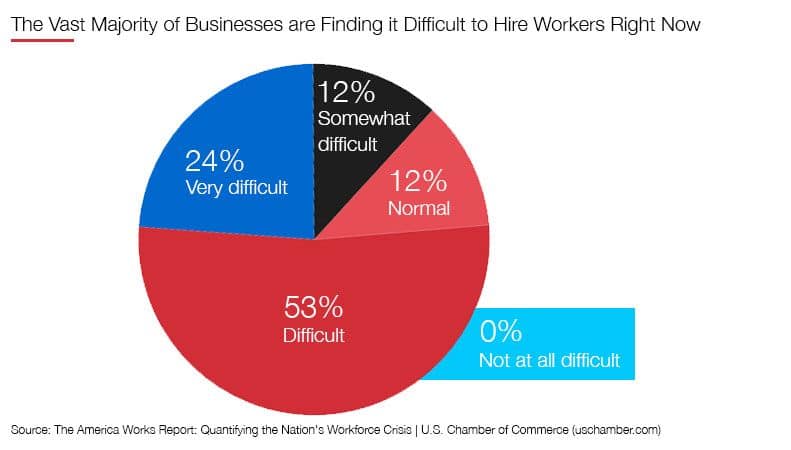“The worker shortage is real—and it’s getting worse by the day.” – U.S. Chamber of Commerce President and CEO Suzanne Clark
The difficult post-pandemic labor market is having an impact on businesses across industries from retail and hospitality to manufacturing and distribution. While there is high demand for salespeople as companies implement aggressive recovery plans, recruiters can’t find people interested in a sales career. In this new world, it is important to make sure your organization is leveraging every possible advantage to deliver value to customers and grow your bottom line, despite the struggle to fill open spots.

In addition to the labor shortage, other factors are challenging sales productivity in B2B markets, according to Forrester:
- B2B buyers are becoming more self-directed, resulting in added complexity. With the ability and inclination to conduct research on their own before enlisting the help of a distributor, these buyers think they know what they want and need.
- Salespeople are not comfortable with virtual selling. Many aspects of personal and professional life were forced to move online in 2020. This move away from face-to-face selling was out of the comfort zone of many, requiring new skill sets and different methods of relationship building. According to the 2021 State of Sales in Distribution survey and report from Distribution Strategy Group, more than half of distributors weren’t satisfied with their sales organization’s performance during COVID. Respondents cited sales teams’ inability to use multiple selling tools, including CRM, web conferencing, analytics and more in their new hybrid-selling environments.
- Many companies are not using technology to its full potential. While organizations may think they are taking advantage of technology, they are often under-adopted and leveraged. When technology isn’t developed for a distributor’s unique needs, adoption rates are often low. For example, distributors find many traditional CRM solutions lacking in their ability to drive sales in high-SKU, omnichannel selling environments.
- The right data is not easily accessible. Moving quickly to help customers is not easy, especially when information to support upsell and cross-sell opportunities is not available in a central, easily searchable location.
- Administrative tasks cannibalize time. Salespeople are busy enough trying to reach sales quotas, but often admin tasks such as entering orders, finding product information, meetings and more take critical selling time away from them. Their time should be spent focused on consultative selling to differentiate against competitors.
How Sales Reps Spend Their Time
According to Salesforce Research, sales reps only spend about 30% of their time selling. To sell more (and therefore become more productive), time spent selling needs to double. The only way to double the time you spend selling is to remove time you spend on other, low-impact activities such as placing orders, requesting info, etc. Today’s labor shortages make it even more important to give sales reps a tool that automates a lot of their manual tasks, and makes the time they spend selling more effective.
What Distributors Can Do to Drive Sales Productivity
Artificial intelligence (AI) is the solution to the combination of a labor shortage and the perpetual need to improve sales rep productivity to stay competitive. A survey from Distribution Strategy Group published by the National Association of Wholesaler-Distributors found that just 12% of distributors use AI in sales and marketing today. And yet, according to our research at Proton, distributors can see a 5-15% increase in sales by implementing cross-sell and upsell AI across sales channels.
Instead of pulling up order history, building manual call lists and searching for product information, AI can point reps to sales opportunities that most warrant their attention. Salespeople become much more consultative and can transition conversations from “What can I help you with today?” to “I noticed you’re buying abrasives from us, but have never purchased air tools. Can I send you some information on a few products?” An AI-enabled sales rep can:
- Focus on the right customers based on churn risk, reorder likelihood or growth opportunity.
- Embrace a complete view of what is happening with each customer.
- Spend less time being reactive and more time being proactive about solving customer needs.
- Have the context they need about every product in their catalog to confidently discuss it with a customer, even if it’s not a product they’ve sold in the past.
- Track what they’re discussing with the click of a button instead of taking manual notes that are hard to search and track.
Build Your Sales Rep Productivity with AI
Be proactive and leverage the benefits of technology to help your organization boost productivity. With today’s hiring challenges, it is more important than ever for your reps to use AI to figure out who to contact, when to contact them and what to pitch, all without losing that personal touch.
Benj Cohen founded Proton.ai, an AI-powered CRM for distributors. His company’s mission is to help distributors harness cutting-edge artificial intelligence (AI) to drive increased sales. Benj learned about distribution firsthand at Benco Dental, a family business started by his great grandfather. He graduated Harvard University with a degree in Applied Math, and speaks regularly at industry events on the benefits of AI for distributors. Benj has been featured in trade publications including MDM, Industrial Distribution, and Industrial Supply Magazine. His company, Proton.ai, announced a $20 million Series A round of funding in 2022, led by Felicis Ventures. In 2023, Benj was recognized in Forbes 30 Under 30 – the first leader in distribution to receive such recognition.

